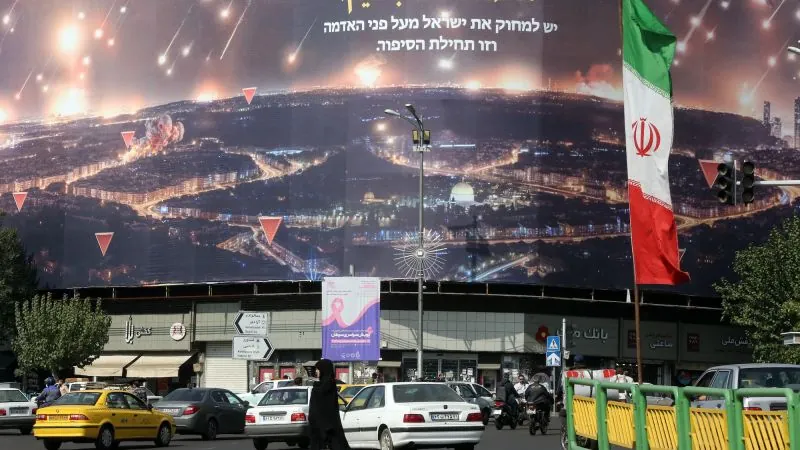
Iran’s High-Stakes Diplomacy Amid Fears of Israeli Retaliation
2024-10-11
Author: Ken Lee
Iran’s Urgent Diplomatic Maneuvers
In a climate of rising tensions, Iran's government is frantically engaging in urgent diplomatic maneuvers with its Middle Eastern neighbors. Their primary objective is to mitigate the potential scope of Israel's response to a missile attack Iran launched earlier this month. If diplomacy fails, Tehran is seeking assurance that its allies can offer some level of protection, with sources revealing a sense of extreme anxiety within the Iranian leadership.
U.S. Concerns and Israeli Strikes
This unease is compounded by uncertainties surrounding the U.S.'s ability to persuade Israel to avoid striking critical Iranian infrastructure, including nuclear sites and oil facilities. Reports suggest that Iran's most significant regional ally, Hezbollah, has recently suffered substantial losses, complicating Tehran's military response options.
U.S. Diplomatic Efforts
In the background, the U.S. is actively consulting with Israel about its forthcoming actions. Officials have made it clear that they are opposed to strikes on Iranian nuclear installations, elucidating their stance during a conversation between President Joe Biden and Israeli Prime Minister Benjamin Netanyahu, marking their first dialogue in nearly two months. President Biden emphasized that any Israeli retaliation should be 'proportional,' indicating the need for restraint in the face of escalating conflict.
Regional Allies' Concerns
Concerns extend beyond military engagements; Gulf allies such as the United Arab Emirates, Bahrain, and Qatar are apprehensive about attacks on Iranian oil facilities. These strikes could trigger significant economic and environmental repercussions for the entire region, leading to a united front of caution voiced to the U.S. by these nations.
Escalating Conflict and Hostilities
The escalating conflict marks a worrying pattern; a series of retaliatory attacks have resumed between Iran and Israel. These hostilities trace back to an alleged Israeli strike on what Iran claimed was its consulate in Damascus. The Biden administration fears this ongoing tit-for-tat could spiral into a significant regional war, potentially drawing the U.S. into the fray.
Israel's Defense Strategy
Adding to the complexity, Israel’s security cabinet is apparently still deliberating its next steps, with no assurances given to the U.S. regarding the targeting of Iranian nuclear facilities. The Israeli military has been preparing for potential attacks on Iran's nuclear program for decades, including conducting simulations of such assaults in recent military exercises.
Warnings from Israel
Israel’s Defense Minister Yoav Gallant has issued a stark warning regarding Israel's forthcoming response, promising a strike that will be 'powerful, precise, and above all – surprising.' This statement underscores the gravity of the conflict at hand, further unsettling neighboring Gulf states, who have expressed their commitment to remaining uninvolved.
Regional Dynamics and Saudi Involvement
Despite Iran's repeated rhetoric warning that any country aiding Israel will be seen as an aggressor, countries such as Saudi Arabia and the UAE have firmly communicated they will not allow Israeli airstrikes to utilize their airspace. Remarkably, even Jordan has vowed to protect its airspace from unauthorized incursions.
Iran's Calculated Response
While the U.S. does not believe Iran desires to enter a full-scale confrontation with Israel, Tehran is aware that any reaction to an Israeli attack must be carefully calibrated. Recent communications from Iranian officials suggest that they are keen to involve Saudi Arabia in securing a peaceful resolution to the crisis. The two nations have held multiple meetings recently, aiming to address regional developments, particularly concerning Iran's concerns regarding Israeli actions in Lebanon and Gaza.
Looking Ahead
The entire world is keep vigilant as Israel weighs its next move. However, it’s important to note that a significant halt in operations is anticipated as Israel observes Yom Kippur, the Day of Atonement, when businesses and transportation services will come to a standstill.
Conclusion
As tensions loom and diplomatic efforts unfold, the situation remains fluid with unpredictable developments on the horizon that could alter the dynamic dramatically. All eyes are trained on the potential repercussions of an Israeli response, emphasizing the urgency of dialogue and restraint in a geopolitically fraught region.




 Brasil (PT)
Brasil (PT)
 Canada (EN)
Canada (EN)
 Chile (ES)
Chile (ES)
 España (ES)
España (ES)
 France (FR)
France (FR)
 Hong Kong (EN)
Hong Kong (EN)
 Italia (IT)
Italia (IT)
 日本 (JA)
日本 (JA)
 Magyarország (HU)
Magyarország (HU)
 Norge (NO)
Norge (NO)
 Polska (PL)
Polska (PL)
 Schweiz (DE)
Schweiz (DE)
 Singapore (EN)
Singapore (EN)
 Sverige (SV)
Sverige (SV)
 Suomi (FI)
Suomi (FI)
 Türkiye (TR)
Türkiye (TR)